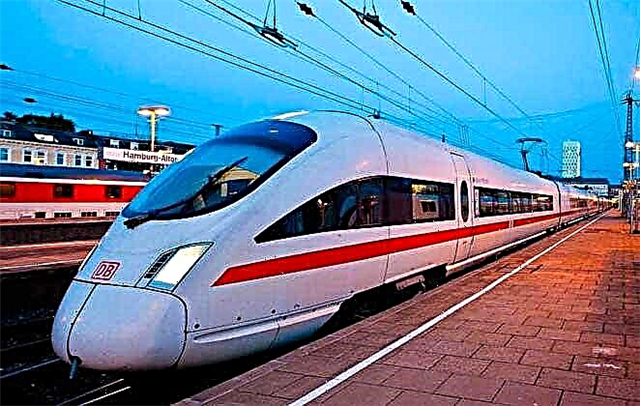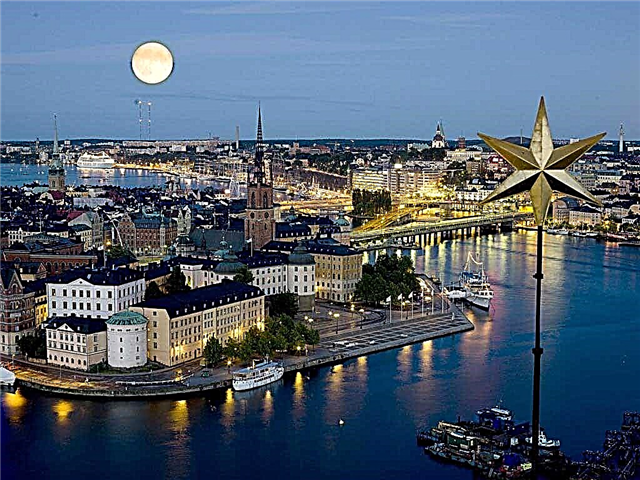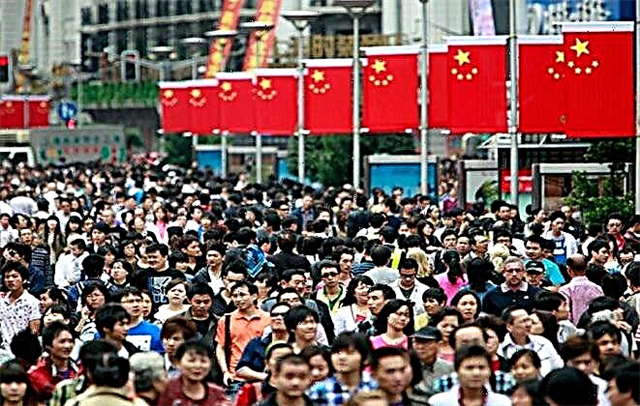Over the past few years, Russians who want to work or settle permanently abroad have increasingly turned their attention not only to Western countries, but also to Asian countries - especially their huge and mysterious southern neighbor. Many are interested in what opportunities and prospects the Russians can count on in China.

History of Russian migration
The first emigrants from Russia appeared in China at the end of the 19th century, during the construction of the Sino-Eastern Railway. Later, a significant number of Russians poured into this country in the 20s of the twentieth century, fleeing from revolutionary cataclysms. In those years, numerous Russian diasporas formed in Harbin, Beijing and Shanghai. But after the Chinese Communists came to power and the Cultural Revolution, most migrants left for Australia or the United States, or preferred repatriation to the USSR.
In Soviet times and the post-Soviet era, only a few specialists and traders visited China on business trips, and such a concept as a "Russian quarter" has practically disappeared in Chinese cities. But in recent years, due to the rapid growth of the PRC's economy, interest in this exotic country has increased significantly.
It is difficult to say exactly how many Russians are in China at present, since many of them live in the country only temporarily or work on a rotational basis. According to statistics, their number in 2021 reaches 50,000.
Attitude towards Russians
The PRC has a positive attitude towards Europeans who come to the country as tourists or specialists. And the way the Chinese treat Russians still bears echoes of their country's friendly ties with the Soviet Union, so local residents often show increased interest and friendliness to Russians.
Even in cities where there are a lot of foreigners, they often receive increased attention. And in the provinces, the appearance of a foreigner on the street is a real event. Europeans are often greeted, scrutinized and even asked for permission to be photographed with them.
The Chinese consider white skin and faces with big eyes attractive, so they often admire the beauty of Russian girls. But at the same time, many local residents perceive foreigners of European appearance as wealthy tourists and often offer them goods and services at an inflated price.
Migrants who have lived in this country for many years say that assimilation in China is difficult for people with European appearance.
Foreigners are always perceived here as foreigners, even if they know the language perfectly, live in the country permanently and have Chinese among their family members.
Features of adaptation of foreigners
According to the reviews of Russian migrants, many of them find it difficult to get used to the crowdedness, high pace of life, very intensive and often unregulated traffic, lack of familiar food. It is difficult to buy cottage cheese and cheese here, which are close to Russian types of bread (especially black). European products are available in some malls and eateries, but they are very expensive.
Only a small percentage of Chinese in big cities and employees of international companies speak English.
It is impossible to navigate the country without knowledge of the Chinese language. But learning it is not easy, and it is because of the difficulties in mastering the language that up to 75% of Russians leave China.
The Chinese dress very democratically, so it is easy to do without expensive fashionable outfits in this country. They work hard and do not like lazy people. In addition, they do not like it when at work someone tries to stand out or boast of their knowledge.
Chinese culture is replete with a variety of traditions and rules of courtesy, which it is advisable to study before arriving in the country and strictly observe, especially if you want to stay here to work for a long time.
Russian diaspora in the PRC
 The Russian diaspora in China is rather fragmented. There is no organization here that would unite all ethnic Russians in the country. Ethnic unions are formed mainly on the basis of territoriality and common interests.
The Russian diaspora in China is rather fragmented. There is no organization here that would unite all ethnic Russians in the country. Ethnic unions are formed mainly on the basis of territoriality and common interests.
Russians in Beijing are mainly concentrated in the area of Yabaolu Street. There are shopping centers with a varied infrastructure, restaurants with Russian cuisine and chefs, hairdressers with Russian masters. This area is home to Russian merchants, translators, stylists, musicians and artists.
In Shanghai, the bulk of Russians are entrepreneurs and students who study at local universities. The "Russian Shanghai Club" and several Russian-language Internet resources operate here.
In Harbin, as well as in the border cities of Hunchun and Heihe, there are many retirees from the Russian Federation who have moved here for permanent residence. They have independent associations that help new migrants navigate local realities. In some places there are hobby clubs (for example, for singing lovers).
In Hangzhou ("Silicon Valley" of China) there are English teachers, models and artists from Russia, there is a bakery called Russian Pie. There are not many Russians here, they unite through the Internet at the www.internations.org forum.
The Enhe-Russian National Volost in Inner Mongolia is the only place in the PRC where Russians are the titular nationality. The Russian Ethnographic Museum has been operating in the village of Shiwei since 2008. Local residents retain the Orthodox faith, but speak mainly Chinese.
Work for Russians
Due to the rapid economic growth in China, the demand for foreign specialists has increased. A foreigner can open his own business or get a job as an employee. But Chinese immigration laws are very strict and work in China is only allowed with a work visa.
Russian entrepreneurs usually trade in Chinese goods at home or try to promote their own products in the PRC.
Unskilled workers (workers in factories, waiters) can earn no more than $ 400-800 per month.
In China, foreign specialists with higher education in the fields of construction, medicine, aviation, and IT are in demand. Also, teachers of the Russian and English languages, fashion designers, artists, dancers are often invited to work. Specialists are paid from $ 1,500 per month, there is no difference in wages for women and men.
Most often, Russians find work in Beijing. In other large industrial centers (Guangzhou, Hong Kong, Shanghai), foreign employees are hired much less frequently. To search for vacancies, you can go to specialized sites.
Chinese education system
The education system in China is largely reminiscent of the Soviet one:
- From 3 to 6 years old, kids go to kindergartens.
- From 6 to 12 years old, children go to primary school, and then move to secondary.
- The full course of schooling is 12 years, but after the 9th grade, you can go to a vocational school and get a specialty.
Education for children in public schools is free and conducted in Chinese. In addition to public schools, there are also private schools. If you have a complete secondary education, you can enter a university. Many Chinese universities have high ratings, their diplomas are valued in the United States and Europe.
Most students from Russia are at the Southern University of Science and Technology (SUSTech) in Shenzhen (with teaching in English), at the University of International Business and Economics in Beijing, at Nankai University in Tianjin.
International Studies University (SISU) and International Hotel Management College in Shanghai, Zhengzhou Uivnersity in Zhengzhou are popular.Education in universities is paid, but scholarships are allocated to foreign students that cover a significant part of the costs or allow them to study almost free of charge.
Standard of living
 Over the past decades, the standard of living in the country has improved significantly, and in 2021 the average salary was about USD 1,000. But real salaries in different regions differ significantly: for example, in rural areas they are less than $ 400-500, and in large cities the average salary reaches $ 1,200.
Over the past decades, the standard of living in the country has improved significantly, and in 2021 the average salary was about USD 1,000. But real salaries in different regions differ significantly: for example, in rural areas they are less than $ 400-500, and in large cities the average salary reaches $ 1,200.
At the same time, life in China is not too expensive - prices for goods and services are much lower than in the USA or Japan. Residential buildings are being actively built in the country, transport infrastructure and the entertainment industry are developing.
When buying an apartment in Shanghai or Beijing, you will pay $ 2,000-4,000 for 1 square meter. You can rent a house in the center of a metropolis for $ 800-1,000 per month, in a residential area - for $ 300-600.
Why Russian pensioners go to China
Russian pensioners in China, especially in the border regions of the Far East, have become a fairly common contingent in recent years.
Many residents of the Russian Federation who have reached retirement age rent or sell their homes and buy real estate on Chinese territory.
The fact is that in Russia, especially in the Far Eastern regions, prices for food and utilities are almost twice as high as on the Chinese side of the border. Therefore, the cost of living in China for Russians is significantly lower than at home, and here you can live comfortably even on a pension of 8,000-10,000 rubles a month for one person.
In addition, many older people with chronic illnesses use traditional Chinese medicine.
According to statistics, more than 40,000 Russian pensioners have already left Siberia and the Far East for this country for permanent residence.
Russian settlements in the PRC
 Russian settlements in China are few. Places of compact residence of immigrants from the Russian Federation can be found in the Heilongjiang province, in the Argun-Yuqi county (Inner Mongolia), as well as in Xinjiang.
Russian settlements in China are few. Places of compact residence of immigrants from the Russian Federation can be found in the Heilongjiang province, in the Argun-Yuqi county (Inner Mongolia), as well as in Xinjiang.
In Inner Mongolia and Xinjiang Uygur Autonomous Region, which in the past belonged to the Russian Empire, Russian Old Believers settled, fleeing the persecution of the authorities. Until the end of the 1930s, Russian schools operated in East Turkestan and Inner Mongolia, and there were many Orthodox churches.
Currently, the largest number of immigrants from Russia live in the city of Gulja. There is an Orthodox church and a cemetery, a Russian school, and some Russian words have become firmly established in local use. Most representatives of the diaspora are of mixed origin, but they carefully preserve the language, culture, traditions and national dishes of their historical homeland. Many guests from the Russian Federation, watching how Russians live in China in these areas, felt as if they were in Russia of the distant past.
There is also a Russian national minority and an Orthodox church in the city of Urumqi, and a Russian ethnographic museum has been set up in Erguna.
In addition to Gulja, "Russian cities in China" are Shanghai, Harbin and many settlements in the border area.
The advantages and difficulties of living in the PRC
Before deciding to leave for China for work or study, it is worth weighing the pros and cons. Main advantages:
- High salaries for specialists in various fields (including teachers of the Russian and English languages, artists, dancers).
- Student scholarships and social benefits.
- Moderate expenses for room and board.
- Proximity to the resorts of Southeast Asia.
- Real prospects of getting a job in the office of an international company.
- Low cost of studying at universities and the opportunity to get a diploma, with which you will be willingly hired to work in Western Europe or the USA.
- Relative proximity to the Far East region of Russia and the ability to keep in touch with the homeland.
The disadvantages include:
- The language barrier and the difficulty of learning Chinese.
- A huge number of people around.
- An unfavorable environmental situation, especially in large cities - foreigners often develop chronic diseases.
- Significant cultural differences that make it difficult for Russians to adapt to life in the PRC.
- Rather unceremonious attitude towards foreigners in everyday life.
- The difficulty of obtaining documents permitting stay in the country.
Thus, whether it is good to live in China, everyone decides for himself.











